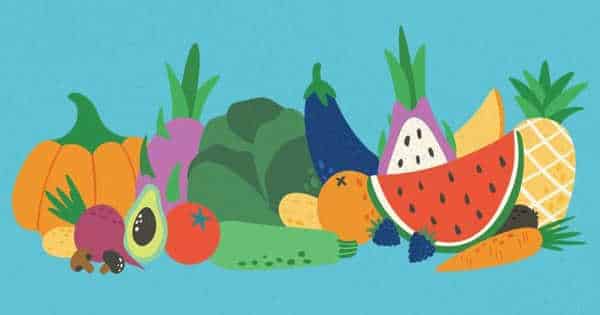According to new research, eating a diet high in fruits and vegetables is associated with less stress. People who ate at least 470 grams of fruit and vegetables per day had 10% lower stress levels than those who ate less than 230 grams.
According to new research from Edith Cowan University, eating a diet high in fruits and vegetables is associated with less stress (ECU). The study looked at the relationship between fruit and vegetable intake and stress levels in over 8,600 Australians aged 25 to 91 who were part of the Baker Heart and Diabetes Institute’s Australian Diabetes, Obesity, and Lifestyle (AusDiab) Study.
People who ate at least 470 grams of fruit and vegetables per day had 10% lower stress levels than those who ate less than 230 grams. The World Health Organization (WHO) recommends that you consume at least 400 grams of fruits and vegetables per day.
Eating a diet rich in fruit and vegetables is associated with less stress, according to new research from Edith Cowan University (ECU).
The study, according to the study’s lead researcher, Ph.D. candidate Simone Radavelli-Bagatini of ECU’s Institute for Nutrition Research, strengthens the link between diets high in fruits and vegetables and mental well-being.
“We discovered that people with higher fruit and vegetable intakes are less stressed than those with lower intakes, implying that diet plays a key role in mental wellbeing,” Ms. Radavelli-Bagatini said.
According to a new study published in the journal Clinical Nutrition, people who ate at least 16 ounces of fruits and vegetables daily reported 10% lower stress levels than those who ate less than 8 ounces.
Researchers examined more than 8,600 Australian Diabetes, Obesity, and Lifestyle Study participants ranging in age from 25 to 91. The larger study gathered a variety of health data, such as dietary choices, medical conditions, and quality of life assessments.

A growing issue
Mental health issues are becoming more prevalent in Australia and around the world. One in every two Australians will suffer from a mental health problem at some point in their lives. Approximately one out of every ten people worldwide suffer from a mental health disorder.
According to Ms. Radavelli-Bagatini, some stress is normal, but long-term exposure can have a negative impact on mental health. “Long-term and unmanaged stress can lead to a variety of health problems such as heart disease, diabetes, depression, and anxiety,” said Ms. Radavelli-Bagatini. “We need to find ways to prevent and possibly alleviate mental health problems in the future.”
The benefits of a healthy diet are well known, but only one in every two Australians consumes the recommended two servings of fruit per day, and only one in every ten consumes the recommended five servings of vegetables per day.
“Previous research has shown a link between fruit and vegetable consumption and stress in younger adults, but this is the first time we’re seeing similar results across adults of all ages,” Ms. Radavelli-Bagatini said. “The study’s findings emphasize the importance of eating a diet rich in fruits and vegetables to potentially reduce stress.”
The researchers were unable to determine why eating more fruits and vegetables improves mood, but Radavelli-Bagatini believes their high nutrient content is likely a factor. “Vegetables and fruits contain important nutrients such as vitamins, minerals, flavonoids, and carotenoids, which can reduce inflammation and oxidative stress and thus improve mental wellbeing,” she explained.
Food and mood
While the mechanisms underlying how fruit and vegetable consumption affects stress are still unknown, Ms Radavelli-Bagatini believes key nutrients may play a role.
“Vegetables and fruits contain important nutrients such as vitamins, minerals, flavonoids, and carotenoids, which can reduce inflammation and oxidative stress and thus improve mental wellbeing,” she explained. “Inflammation and oxidative stress in the body are well-known factors that can contribute to increased stress, anxiety, and depression.”
These findings encourage more research into diet, specifically what fruits and vegetables provide the most mental health benefits.
The study is part of ECU’s newly established Institute for Nutrition Research, which aims to investigate how nutrition can aid in the prevention and treatment of chronic health conditions. The study was published in Clinical Nutrition and was titled ‘Fruit and vegetable intake is inversely associated with perceived stress across the adult lifespan.’















